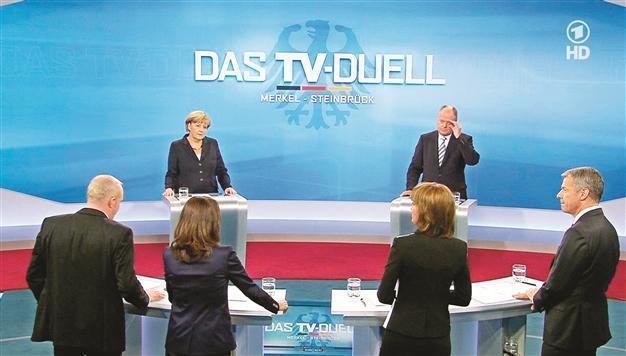Merkel and challenger clash on European austerity on TV
BERLIN - Reuters

This screenshot made available by public broadcaster ARD shows German Chancellor Angela Merkel and her challenger Peer Steinbrueck of the SPD during a television debate in Berlin. AFP photo
Chancellor Angela Merkel’s challenger in this month’s German election has accused her in a television debate of crushing southern European countries with austerity, declaring her euro crisis strategy a failure.
Merkel, who is seeking a third term in the Sept. 22 vote, hit back, pointing out that rival Peer Steinbrueck’s Social Democrats (SPD) had supported her euro policies in parliament throughout the turmoil of the past years.
“You voted for everything,” Merkel said on Sept. 1, turning and smiling at her rival.
The clash, being watched by an estimated 15 million viewers, was seen by many as Steinbrueck’s last chance to change the momentum in a campaign in which he has trailed from the very start.
He didn’t waste time attacking Merkel, accusing her of waltzing from one international summit to the next, without tackling the problems at home in Germany, and dismissing her pullout from nuclear energy as a “disaster”.
But some of the sharpest clashes came on the subject of Europe, a topic that had played only a small role in the campaign until a debate flared late last month over whether Greece might require a third bailout after the German vote.
“I would have followed a different crisis strategy. Of course there must be budget consolidation in these countries, but not a deadly dose,” Steinbrueck said.
“Germany once got help too and we must not forget that. Germany was massively helped after the Second World War with the Marshall Plan.”
Merkel retorted that it was under SPD chancellor Gerhard Schroeder that Greece had been allowed to join the euro and that European budget rules had been loosened.
Dressed in black, both candidates appeared relaxed. Merkel turned often to speak directly to her challenger, while Steinbrueck stared straight ahead at the panel of four questioners.
Minimum wage, taxesThe German economy has performed better than its European peers during the euro crisis, with unemployment now hovering near its lowest levels since reunification in 1990.
But Steinbrueck stressed that not all Germans were prospering, with 7 million people earning less than the 8.50 euro per hour minimum wage that his party wants to introduce, funded by income tax increases for top earners.
“The tax hike plans of the Social Democrats and the Greens bring with them the risk that we spoil the good situation that we have instead of improving it,” Merkel responded.
The candidates also touched on Syria, ruling out German participation in a military intervention, which opinion polls have shown is deeply unpopular here.
A poll from Infratest Dimap last week showed 54 percent of German voters want Merkel to stay on as chancellor, compared to 28 percent who would like Steinbrueck to replace her.
A survey from Emnid published on Sunday showed Merkel’s conservative bloc -- the Christian Democratic Union (CDU) and the Christian Social Union (CSU) -- with a 16 point lead over Steinbrueck’s SPD.
The size of the gap means it is highly likely that Merkel will remain chancellor after the election. What is less certain is whether she will win enough votes to continue her centre-right coalition with the business-friendly Free Democrats (FDP).
Should she fall short, she will be forced into difficult coalition talks with the rival SPD, with whom she ruled between 2005 and 2009. Steinbrueck was finance minister in this right-left “grand coalition”, but he has ruled out serving under Merkel a second time.
The last two German debates, in 2009 and 2005, had little impact on the final outcome. But in the 2002 clash, incumbent Gerhard Schroeder came from behind to win re-election after wrong-footing conservative challenger Edmund Stoiber on his support for the looming U.S.-led invasion of Iraq.
Studies show up to 5 percent of German voters make their decision based on the TV duel, enough to change the outcome.
